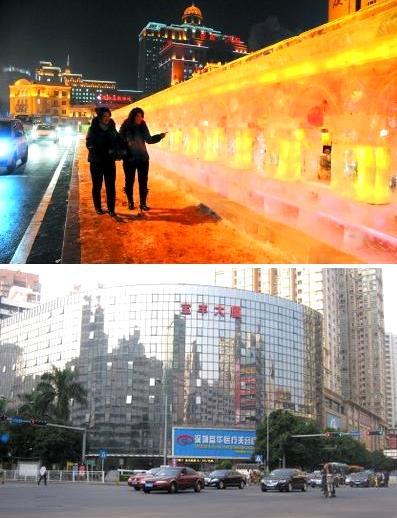
SHENZHEN IS NOT as warm as Harbin, Cathy Ji, a 20-something model and native to the Northeastern Chinese city best known for its annual Ice Festival, tells NextInsight.
Ms. Ji’s assessment of her newly adopted city of Shenzhen at first took me aback, but she explained that she wasn’t talking about the weather, and said this southern Chinese boomtown needed to bring its social etiquette and business ethics up to speed with its phenomenal economic growth if it wanted to thrive long term.
As even the most fair-weather reader of NextInsight has gathered by now, twice each month we feature a professional based here in Shenzhen, China’s most crowded cities and one of its fastest growing – in terms of its GDP as well as its population.
Shenzhen is a city of immigrants, though not in the same sense of the word that we might consider a New York or a London.

That is because Shenzhen’s “immigrants” predominantly come from other regions of the same country – China.
In New York, there is not one, but two Chinatowns, both sprawling zones – one in lower Manhattan where Cantonese is typically heard, and another in Flushing, Queens where Mandarin is the more common lingua franca.
And walk a few blocks uptown along Manhattan Island and you will pass by Little Italy, Koreatown, and the list goes on.
But things are different here in China.
In fact, of all of China’s major cities with populations over three million – and there are dozens of them -- Shenzhen has the highest proportion of non-native denizens.
Which brings us to today’s featured Shenzhener – Cathy Ji.
Originally from Harbin, the frigid provincial capital of Heilongjiang in China’s far Northeast, Ms. Ji worked as an intern administrative assistant at Nokia Siemens Networks for a year before packing her bags and heading south... way south... to Shenzhen, to pursue further language studies and work part-time as a model.
She has been in Shenzhen for nearly two years and having worked and lived on opposite sides of China, offers excellent insights into what makes this city click, as well as pointing out where the socioeconomic machinery might need a drop of oil here and there to keep humming along smoothly.
I met up with her recently, and she answered in mixture of Mandarin and English.

NextInsight: You worked for Nokia-Siemens up north. That can’t have been such a bad gig. After all, Nokia is the best selling cell line in the world. What made you come south?
Ms. Ji: Yes, it’s true, I really liked that job. It was my first “real job” and allowed me to learn and refine skills in professional human resources management, as well as get a chance to come closer to mastering business English. But it was after all an internship at its core, and there is an expiration point on these sorts of things.
The nice thing about my decision to come to Shenzhen is that I feel I can always go back to Nokia-Siemens, if I want, because I have paid my dues there, so to speak, as an intern. So with that knowledge in mind, it was easier to come to the decision to come south and try my luck here.
You’ve worked in both the north and now here in Shenzhen. What are some of the main differences between the two places, workwise, that jump out at you?
Ms. Ji: Well, taking Harbin as an example, there are lot of government sectors in Harbin and a lot of people work for the government, including both my parents. My father is a police captain and my mother works for the Social Welfare Bureau assessing individual cases.
However, Shenzhen is much different in that it seems everyone I meet here works for a private firm, or they have opened – or aim to open – their own company. There are definitely a lot more private enterprises in Shenzhen.
That being said, I can understand why this city is such a draw, with all the business activity and all the workers and investment that attracts.
But it also makes me wonder – where are all the teachers and street cleaners? I can’t help but noticed that there seem to be a lot of smart and capable people here in Shenzhen, so I know there must be teachers around. And I can’t complain about the cleanliness here, as the streets seem clean enough, so who does the sweeping. All I am saying is that I have been here for nearly two years and have never had any stranger introduce themselves as teachers or public sector employees. Strange. Maybe they all live out in the outskirts in teachers’ and street sweepers’ dorms.
And there is certainly a much deeper sense of community in Harbin.

We may have the Ice Festival, and many fruits are very hard to come by in the winter, but I would characterize my hometown of Harbin as a much warmer city than Shenzhen.
The money is certainly an attraction too. How drastic a gap in salary for the same jobs do you notice between here and back north?
Ms. Ji: Like I said, most of the people I know back in Harbin work for the government. Perhaps this is because Harbin is the provincial capital, or because there is noticeably a smaller high-tech presence, or perhaps it is simply because my parents are themselves civil servants and that’s the crowd I gravitate towards.
That being said, salaries in Harbin seem to be very unified and standardized, as teachers and police all seem to be within a couple thousand yuan per month apart per month, regardless of their position or tenure.
However, Shenzhen, with all its private industry, is clearly more diverse in terms of take-home pay. You can see it the moment you arrive at the airport or train station. The more well-to-do whip out their very expensive cell phones (I know because I worked at Nokia-Siemens) and call their drivers to let them know they have touched down – often while the plane is still hurling down the runway with brakes fully engaged!
But the masses arrive in Shenzhen with most of their worldly possessions on their back in huge colorful sacks. And while they may own a late model cell phone (everyone in China has a handset of some sort!) they certainly aren’t calling their drivers from the train platform, that I am sure of.
So whether or not you consider it fair, Shenzhen seems to have a more institutionalized performance-based salary system in place. If not, why would so many people flock here to seek work?
Is there a difference in management mentality? Are bosses fairer here or there?
Ms. Ji: Although I haven’t had many jobs yet in life, I can say that my friends back in Harbin are just as likely to gripe about their bosses as they are here. It seems to be universal phenomenon, right?
How about the workers? If you met two workers in third location – one based in Harbin and the other in Shenzhen – would you be able to tell the difference?

Ms. Ji: I think they would both be committed to their jobs. After all, jobs... good jobs... are not all that easy to find. However, from personal experience, I think it would be obvious that the Harbin-based worker would seem happier in his or her work, and might even smile now and then. But as much as I respect the diligence of the workforce here in Shenzhen, there isn’t much of a “whistle while you work” mentality here. In fact, the reputation of Shenzhen as a major labor magnet has resulted in what I can only call a “robotification” of the population. People seem to just live for working here, whereas in Harbin, people are more likely to work for a living.
With everyone chasing the almighty renminbi here, and all coming from different parts of China and not knowing the person’s name beside you in the office or assembly line – it can be quite dispiriting and depressing at times. The economy draws so many people to Shenzhen. But its relentless emphasis on work and performance also robs this city of its spirit, its soul, in a way, and makes it impossible to develop a sense of community.
How can you be best friends with your colleagues when you are all essentially competing with one another for raises or promotions?
The same is true in my two undertakings right now. I work mainly as a model for spot advertisements, doing a lot of auto promotions. And although when I show up to a shoot I may be chatting pleasantly with my fellow modeling friends... make no mistake about it. We are all trying to get the attention of the boss and photographer so as to land the main shoot!
And even in my two classes I take on the side: Japanese and English. Although it is not as competitive as back in high school, we are all basically competing with each other so as to get the best grades and a crucial letter of reference from our instructor when we “graduate.”
Letters like these open doors to new jobs down the road.
But I find myself liking this place, against my better judgment perhaps. They drive and competitiveness here can be quite thrilling... and addictive.
However, I think Shenzhen should study Hong Kong’s development model closely. I have been there and they not only have a vibrant economy, but a very civil society. So, it can be done.

See previous pieces on Shenzhen pros:
SHENZHEN NURSE Setting Sights HIgh
SHENZHEN EXPAT: Briton Walking On The Wild Side
SHENZHEN GIRL: Loses, Finds Self In Myanmar







